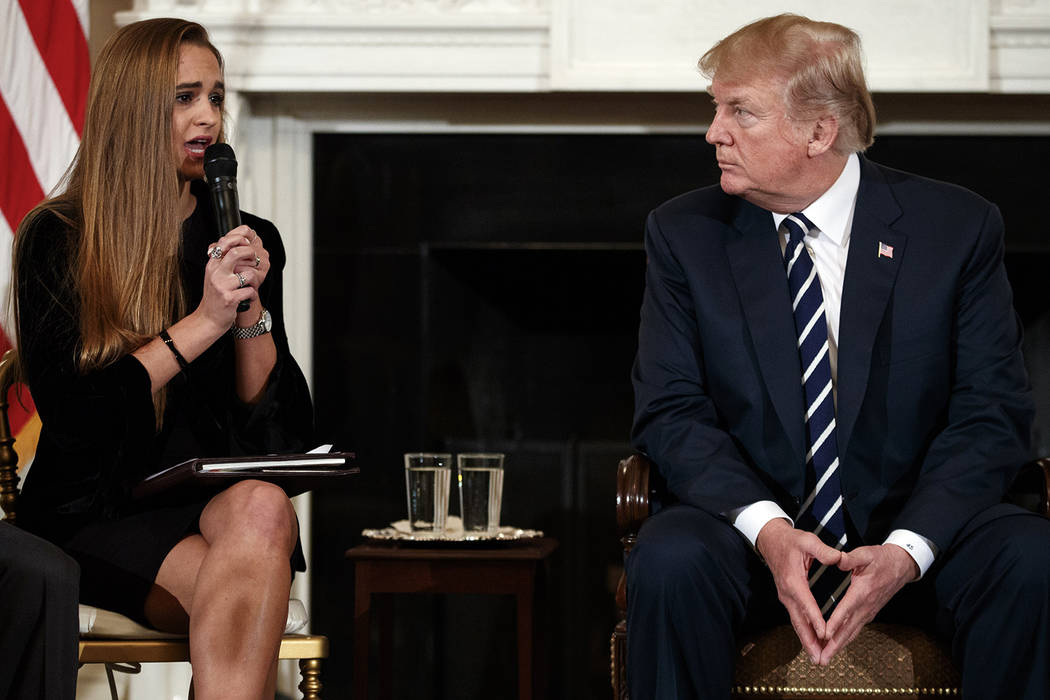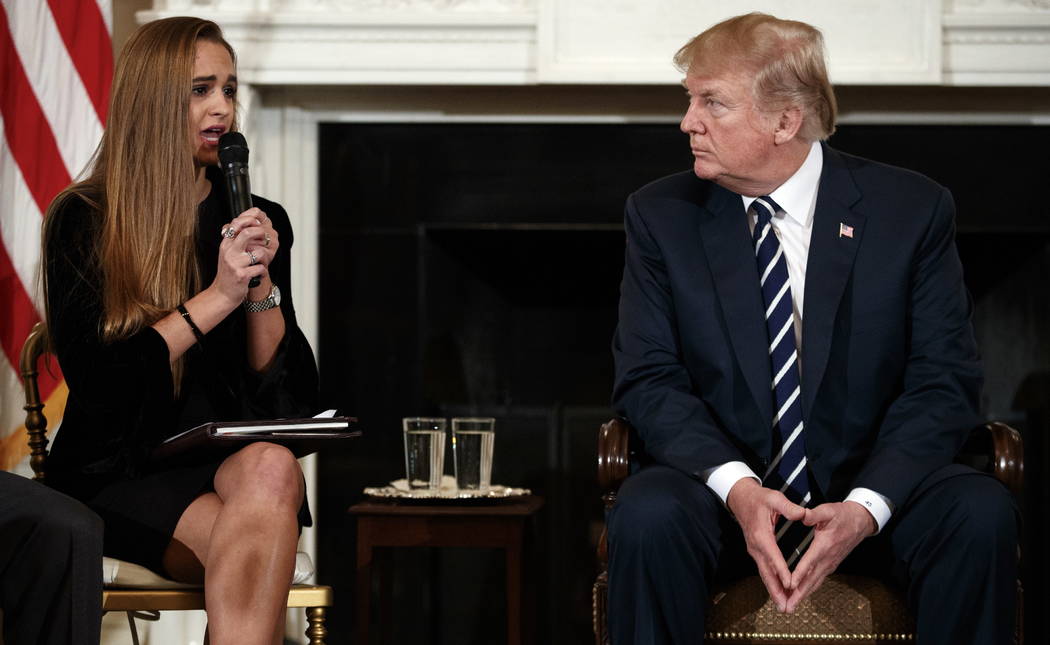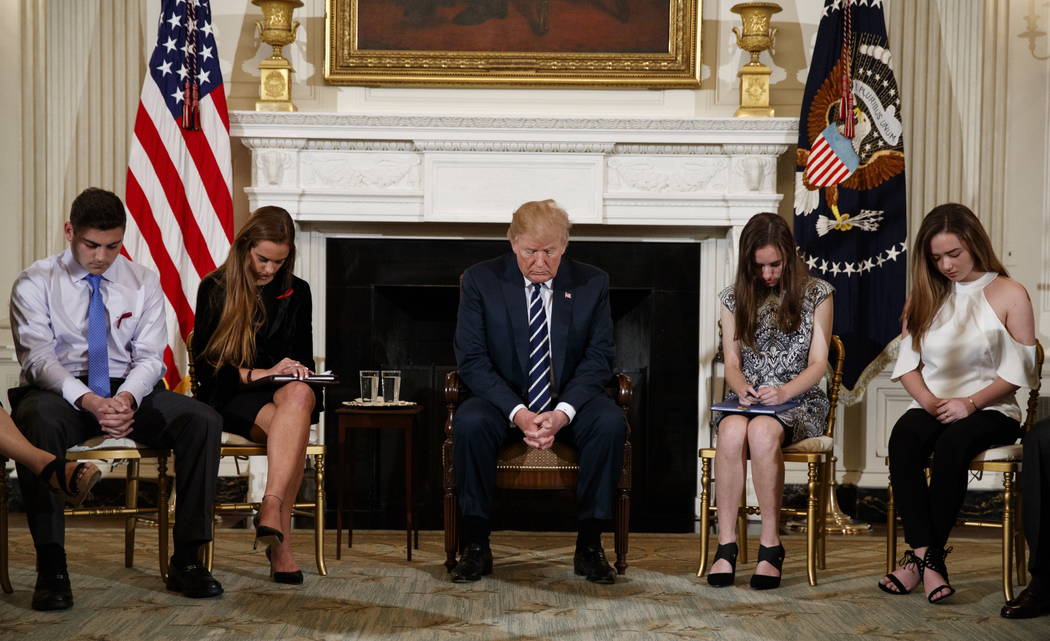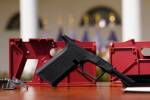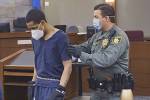School shooting survivors, family members plead with Trump for action
WASHINGTON – Survivors and family members of victims of mass school shootings implored President Donald Trump on Wednesday to make sure another school shooting never happens again.
In the wake of last week’s shooting at a Florida high school that left 17 dead, grief-stricken survivors discussed their terror-filled moments during a “listening session” with the president at the White House.
“This is a long-term situation that we have to solve,” Trump assured the group. “We’ll solve it together.”
Trump asked participants for specific suggestions for making schools safe. He also offered that he is open to raising the age of eligibility to buy a gun, to improving background checks, arming teachers, placing former military members in schools, and a return to a system that provided institutional care for the mentally ill.
First, those in the White House State Dining Room told their stories.
“I turned 18 the day after” the shooting, Marjory Stoneman Douglas High School student Samuel Zief, 18, told the group. He said he “woke up to the news that my best friend was gone and I don’t understand how I can still go into a store and buy a weapon of war,” referring to the AR-15 used by the alleged shooter.
Zeif sobbed openly as Nicole Hockley, who lost her 5-year-old son Dylan in the 2012 Sandy Hook Elementary school shooting that left 20 children and six adults dead, addressed Trump.
“How many more teenagers can we allow to die?” Hockley asked.
Andrew Pollack, whose daughter Meadow died last week, gave voice to a father’s fury when he told the group, “I’m pissed because my daughter, I’m not going to see again. She’s not here. It’s not about gun laws right now. Let’s fix the schools first. Let’s get together, work with the president, and fix the schools. That’s it.”
He added: “9/11 happened once and they fixed everything.”
Participants listened respectfully to each other for more than an hour and presented sometimes opposing viewpoints. For example, parents politely made a case both for and against arming teachers and other school personnel.
While some participants voiced their faith that Trump would do something to curb gun violence, their solutions ranged from placing undercover cops as school janitors to a ban on assault weapons.
Vice President Mike Pence and Education Secretary Betsy DeVos delivered remarks to the group, which included a couple who lost their daughter during a school shooting in Columbine, Colorado, in 1999. Pastor Pasqual Urrabazo, of the International Chuch of Las Vegas, delivered a prayer before the session began.
Parkland, Florida, Mayor Christine Hunschofsky read from texts sent to her by fathers of two Stoneman Douglas victims. One, she said, “does not believe there’s a need for assault rifles.” He also faulted the FBI for missing warnings about the accused shooter.
Another father, Hunchofsky said, wants the administration to “publicly acknowledge the role of guns.”
Earlier in the day, high school students from the Washington area protested in front of the White House. “We don’t want an 18-year-old to have, for example, an assault rifle,” said Kelly Leak, 15, of Silver Spring, Maryland.
What did she think of the president’s listening session? “I think it’s good that he’s ready to listen,” Leak answered.
After all the noise from both sides of the gun debate, Hoover Institution senior fellow Bill Whalen said it was “refreshing to hear people voice their concerns, but also look for solutions.” Whalen said that America got a glimpse of the Trump some supporters talked about during the 2016 election — a pragmatic executive who can listen and act.
“It was a master stroke.” said communications specialist and speech coach Ruth Sherman. “He convened this. He allowed this to be televised.”
Sherman especially liked that the White House invited a diverse group that included teachers and students from Washington area schools.
Photographers zoomed in on a notepad in Trump’s hands with five points. “What would you most want me to know about your experience,” was the first point. “I hear you,” was the fifth.
The Coalition to Stop Gun Violence tweeted, “.@realDonaldTrump You can remind yourself to say “I hear you” but are you actually listening? #NeverAgain.”
Contact Debra J. Saunders at dsaunders@reviewjournal.com or 202-662-7391. Follow @DebraJSaunders on Twitter.
Bill planned to restore ban
WASHINGTON — A Rhode Island lawmaker plans to introduce a bill next week that would restore the federal assault weapons ban — legislation that has the backing of two Las Vegas Democrats in the House.
Rep. David Cicilline, D-R.I., sent the bill draft to colleagues this week seeking support for the 10-year ban that expired in 2004. He cited the use of the AR-15 semi-automatic rifle, which would fall under the ban, in recent mass shootings in Florida, Texas, Nevada and Connecticut.
Rep. Dina Titus and Rep. Jacky Rosen, both Las Vegas Democrats, plan to co-sponsor the bill.
The assault ban was signed into law by President Bill Clinton. It was in effect from 1994 to 2004, when it expired. Several attempts by Congress to restore the ban have since failed.
— Review-Journal Washington Correspondent Gary Martin



